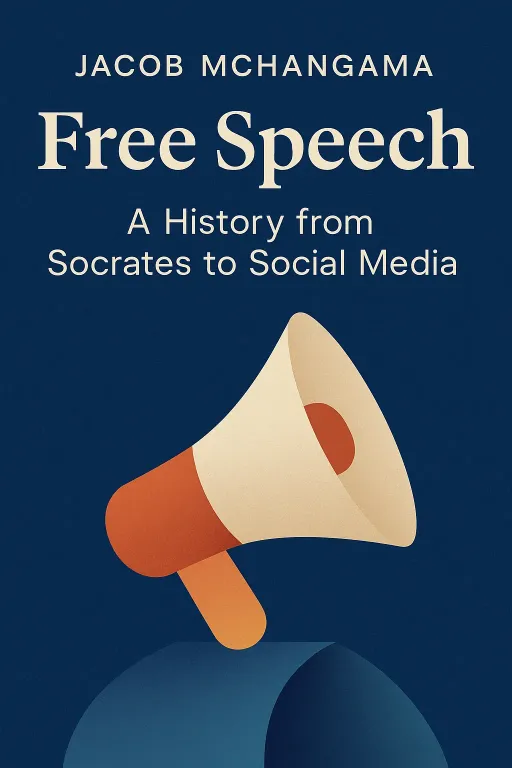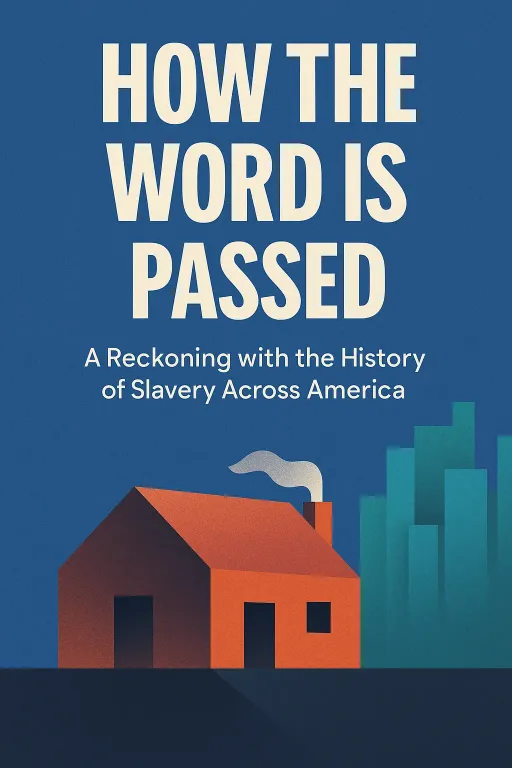
Free Speech
10 minA History from Socrates to Social Media
Introduction
Narrator: What if the very democracy that celebrates free thought decided to execute its most famous philosopher for thinking too freely? In 399 BCE, this wasn't a hypothetical. The citizens of Athens, the cradle of democracy, sentenced Socrates to death. His crime? Refusing to recognize the state's gods and "corrupting the youth" with his relentless questioning. This ancient paradox—a society prizing open debate yet killing a dissenter—is not an isolated event. It is the central, recurring conflict in the long and turbulent history of our most essential freedom.
In his comprehensive work, Free Speech: A History from Socrates to Social Media, author Jacob Mchangama reveals that the battle for free expression is not a modern, Western invention but a global, millennia-long struggle. The book argues that free speech is a fragile and counterintuitive idea, constantly threatened by a powerful force he calls "free speech entropy"—the tendency for all systems, even the most enlightened, to eventually seek to control and limit expression.
The Ancient Paradox: Free Speech as Both a Democratic Ideal and a Threat
Key Insight 1
Narrator: The concept of free speech is often traced back to ancient Athens, which prided itself on isēgoría, the equal right of citizens to speak in the public assembly, and parrhēsía, the license to say what one pleased. As the statesman Pericles boasted, Athenians submitted their policies to proper discussion, believing it was essential for sound decision-making. Yet, this same society that celebrated open debate could not tolerate the philosophical provocations of Socrates. His trial reveals the inherent fragility of free speech: when a democracy feels threatened or unstable, it can turn on its most challenging voices in the name of social order.
The Roman Republic offered a different model, but one that was equally conditional. Rome valued libertas, or liberty, but it was an elitist concept. Vigorous debate was a privilege of the powerful senators and magistrates. For ordinary citizens or poets who dared to criticize the elite, their speech was dismissed as licentia—an abuse of freedom. The poet Gnaeus Naevius learned this the hard way in 206 BCE. When he used his plays to denounce Rome's leading men, he was imprisoned and exiled. His fate sent a clear message: in Rome, your right to speak depended entirely on your social standing. This tension between an egalitarian ideal and an elitist privilege has remained a central battleground in the fight for free speech ever since.
The Double-Edged Sword of Technology: How the Printing Press Ignited Both Reformation and Repression
Key Insight 2
Narrator: For centuries, the Catholic Church held a monopoly on information in Europe. But in the mid-15th century, Johannes Gutenberg's printing press shattered that control. This new technology was a revolutionary force, and no one harnessed its power more effectively than Martin Luther. In 1517, his Ninety-Five Theses—a list of grievances against the Church—were not just nailed to a church door; they were printed and distributed across the continent. A single monk’s protest became a viral sensation, sparking the Protestant Reformation. Luther himself called the press "God’s highest and extremest act of grace."
However, this new technology was a double-edged sword. The same presses that carried Luther's calls for reform also printed vicious propaganda, fueling a century of brutal religious wars. And once they established their own power, reformers like Luther and John Calvin proved just as intolerant as the Church they had replaced. They created their own systems of censorship and ruthlessly persecuted those who dissented from their new orthodoxy. The story of the Reformation demonstrates a timeless pattern: new communication technology is inevitably disruptive, empowering dissenters and threatening established authorities, who in turn seek to control it, often leading to violent conflict.
The Hypocrisy of Liberty: The Suppression of Speech in the Name of Freedom
Key Insight 3
Narrator: In the 19th century, the United States championed its First Amendment, yet a massive exception to this freedom existed in the American South. To protect the institution of slavery, Southern states enacted what Mchangama calls the "Slaver's Veto." They passed draconian laws that made it a crime—in some cases punishable by death—to circulate "incendiary" abolitionist literature. Post offices were raided, books were burned, and editors were attacked.
It was in this climate that abolitionists like Frederick Douglass, a former slave, argued that free speech was the most potent weapon of the oppressed. "Slavery cannot tolerate free speech," he declared, because the institution could not survive open debate. This hypocrisy was not unique to America. The British Empire, which celebrated its own tradition of liberty at home, imposed racially motivated censorship in its colonies. In India, anticolonial leaders like Mahatma Gandhi were jailed for sedition, with the British government using the law to crush any speech that challenged its authority. These examples reveal how easily societies that praise liberty can justify suppressing the speech of those they deem dangerous or inferior.
The Totalitarian Temptation: Why Democracies Fear Both Unchecked Speech and Its Restriction
Key Insight 4
Narrator: The 20th century saw the rise of totalitarian ideologies that systematically annihilated free expression. In the Soviet Union, Fascist Italy, and Nazi Germany, the state seized absolute control over information, turning the press into a propaganda machine and ruthlessly eliminating all dissent. The tragic history of this era has led to an enduring debate: to protect democracy, must we be intolerant of intolerance?
Mchangama challenges this idea by examining the "Weimar fallacy"—the argument that Germany's Weimar Republic fell to the Nazis because it was too tolerant of their hateful speech. The historical record is more complex. The Weimar government did, in fact, try to suppress the Nazis, banning their newspapers and meetings. However, these attempts often backfired, giving the Nazis publicity and turning them into martyrs for free expression. Ultimately, Hitler did not rise to power by winning a debate in the marketplace of ideas. He dismantled democracy by exploiting the state's emergency powers—the very tools of restriction—to silence all his opponents. This history serves as a cautionary tale that sacrificing free speech to fight extremism can create a dangerous precedent, providing authoritarians with the legal weapons to destroy liberty itself.
The Digital Dilemma: The Internet as Both a Liberation Tool and a Panopticon
Key Insight 5
Narrator: The dawn of the internet was hailed as a new age of universal free expression. Early optimists believed it would topple dictators and create a global village of open discourse. The Arab Spring in 2011 seemed to confirm this, as activists used social media to organize protests and circumvent state censors. But just as with the printing press, the initial flash of freedom has been followed by a wave of control.
Today, we are in a "free speech recession." Authoritarian regimes have adapted with terrifying efficiency. China has built the "Great Firewall," the most sophisticated censorship and surveillance system in human history, and is exporting its model of digital authoritarianism abroad. Meanwhile, in Western democracies, "elite panic" over disinformation and hate speech has led to increasing calls for content moderation and regulation. Tech giants, acting as de facto global arbiters of speech, deplatform controversial figures like Alex Jones, raising profound questions about who should hold such power. The internet has not resolved the historical tensions around free speech; it has amplified them on a global scale, repeating the age-old cycle of disruption, panic, and the relentless drive to control the narrative.
Conclusion
Narrator: The single most important takeaway from Free Speech: A History from Socrates to Social Media is that the struggle for free expression is a perpetual one, defined by a constant, cyclical battle against the human impulse to censor. This "free speech entropy" is not limited to tyrants or theocrats; it is a temptation that exists within all societies and even within ourselves. History shows that every argument for censorship today—protecting national security, safeguarding public morals, preventing social unrest—has been used by those in power for centuries to silence dissent.
Mchangama's work challenges us to look past the immediate controversies of our digital age and see the long, historical arc. The book leaves us with a critical question: Do we have the courage to defend the speech of those we despise? History suggests that a society's commitment to that principle is the only reliable safeguard for the freedom of all.









